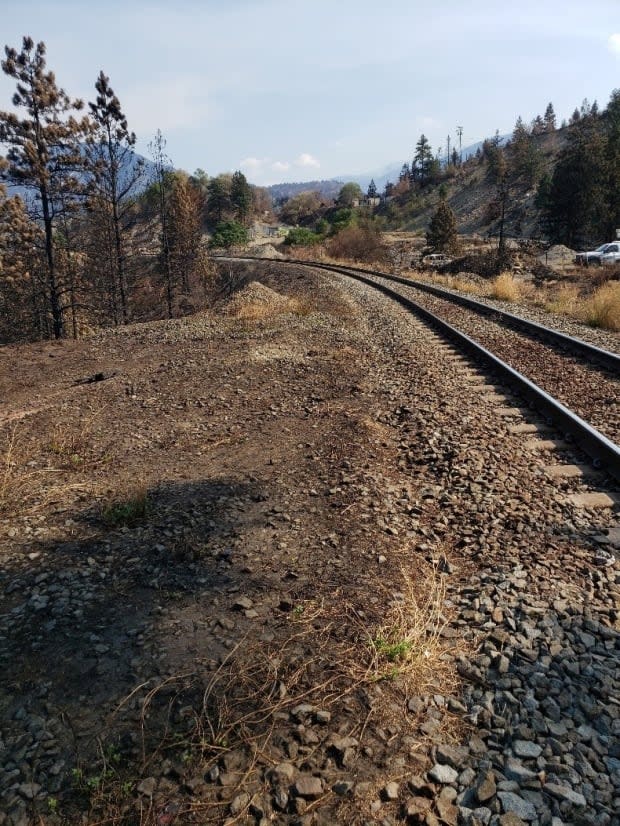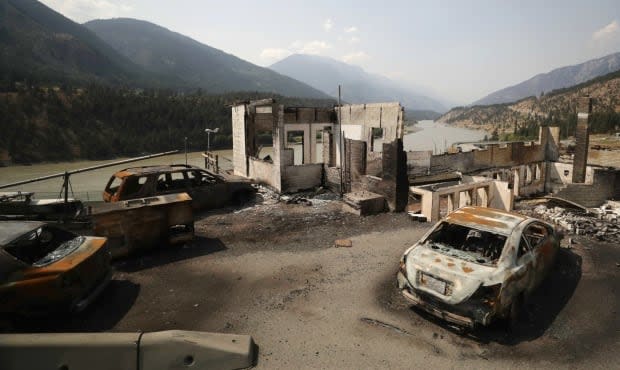Investigators haven't found evidence linking train activity to Lytton fire, TSB says

Investigators have not found any evidence that trains running near the village of Lytton, B.C., were responsible for the catastrophic fire that engulfed the community and killed two people in June, the Transportation Safety Board said Thursday.
The findings counter residents' allegations that passing trains with CN or CP rail started the fire. Locals have said they believed sparks flying from the railway likely ignited bone-dry terrain, made prone to fire by an extreme heat wave that week.
The board said its team didn't find a connection despite three months of "significant investigative work," though it confirmed that work did not include any direct interviews with residents.
"We have found no evidence to conclude that the Lytton fire was started by railway activities in the area," TSB chair Kathy Fox said during a news conference Thursday.
The agency said unless new information comes forward, it has no need to investigate further and it won't publish a report on the fire.
Hundreds of people living in and around the village of Lytton, perched in the Fraser Canyon mountain range northeast of Vancouver, were forced to leave with little notice on June 30 as the fire raced through the community.
They fled as smoke and flames, spread by extreme wind, consumed the village in one of the most destructive fires in recent B.C. history. Two people died.
WATCH | Residents speculated in July a train caused the fire:
Fire started steps from CN Rail line
The fire started "within five feet" — or less than two metres — from the centre of CN Rail track west of the village core, according to the TSB.
A westbound CP coal train run by CN crews was the last train to pass through the area, 18 minutes before the first reports of flames.
The board's summary, released Thursday, said investigators confirmed with both CN and CP railways that there had been no rail grinding activities on the track. The team found no signs of hot bearings, burned brakes or other potential fire-creating problems in the train.
It said a simulation to test the train as though it were fully loaded didn't find any "sparking."

The village had endured three days of extreme temperatures in the days before the fire, hitting a high 49.6 C as a heat wave baked Western Canada. The earth and vegetation in town was parched and vulnerable to the fire, locals said.
The majority of buildings in town were reduced to ash. Residents and families who toured the aftermath by bus in July saw only scorched frames remaining of their cars and homes, if there was anything left to see at all.
Residents were not interviewed
Carmichael confirmed the TSB team "did not have any direct interviews with any resident of Lytton," despite it being largely residents who've claimed they saw flames and smoke firsthand in the village area before the fire.
Fox said the team instead interviewed railway staff and gathered "information from other agencies" for the investigation.
WATCH | Extensive damage all that remains in Lytton:
The Thompson-Nicola Regional District and the Lytton First Nation have both said they believe a train was responsible for the fire.
One resident filed a proposed class-action lawsuit filed in August on behalf of those who lost their homes or businesses in the village, claiming the fire was caused by heat or sparks from a train. The lawyer on the case said weather conditions, the train schedule, eyewitness accounts and the burn pattern near the rail tracks all lead them to believe the fire was caused by trains.

The allegations in the lawsuit have not been proven in court and neither rail company has filed a statement of defence.
In July, Canadian Pacific Railway said in a statement it found nothing to indicate that any of its trains or equipment that passed through Lytton caused or contributed to the fire. Canadian National said video footage posted on social media after the fire was not connected to the village.
More than 100 days after the fire, residents have lamented sluggish recovery efforts and hazy communication from local governments responsible for rebuilding the village. Nearly 800 residents registered with B.C. Emergency Support Services in the aftermath, in addition to nearly another 500 people from the Lytton First Nation.
The TSB said it would reopen its investigation if "compelling" new evidence comes forward, but would not elaborate on what kind of evidence would meet that bar.
The BC Wildfire Service is still continuing its own investigation. The RCMP is also working to determine whether any criminal activity led to the fire, but said Thursday it couldn't estimate how much longer that investigation will take.


